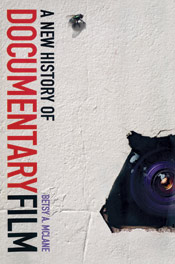Fall 2012
(Continuum, 456 pages, $34.95)
By Betsy A. McLane
This year marks the 80th anniversary of the first feature-length documentary, Robert Flaherty's Nanook of the North, making this an ideal time for some reflection on this deeply complex, singular film genre. In her newly updated edition of A New History of Documentary Film, Betsy McLane, director emerita of the International Documentary Association, manages to be both exhaustive in scope and concise in approach. She offers an account of the genre's history as context for the current state of documentary film, while also considering the future of non-fiction films.
 Documentary films made their first significant impact, on a mass scale, in the United States during World War II. Directors such as Frank Capra, John Huston, John Ford and William Wyler were responsible for highly influential wartime docs, and upon returning to Hollywood, their feature films displayed a greater sensitivity to social issues; although most of them never directed another documentary.
Documentary films made their first significant impact, on a mass scale, in the United States during World War II. Directors such as Frank Capra, John Huston, John Ford and William Wyler were responsible for highly influential wartime docs, and upon returning to Hollywood, their feature films displayed a greater sensitivity to social issues; although most of them never directed another documentary.
McLane stresses advancement in technology as the reason for the genres gradual growth. She traces how the advent of handheld, mobile cameras made long, continuous takes and two-man crews possible, leading to the birth of cinema verite. Films like Robert Drew's Primary, D.A. Pennebaker's Dont Look Back and The Maysles' Brothers Grey Gardens, would eventually blur the lines between reality and fiction.
McLane gives special mention to the advances made by women documentarians. She shows how Perry Miller Adato's belief that each film must arrive from the style and personality of the artist led to her 1977 documentary Georgia O'Keeffe, for which she was the first woman to win the DGA Award for Documentary Television. Today, McLane notes, topical documentary directors such as Alex Gibney (Taxi to the Dark Side) and Davis Guggenheim (An Inconvenient Truth) are creating potent films examining urgent global issues. Non-fiction films have also demonstrated the power to literally save lives evidenced by Errol Morris' The Thin Blue Line and Bruce Sinofsky and Joseph Berlinger's Paradise Lost trilogy.
McLane approaches the future of documentary filmmaking with cautious consideration. She acknowledges that in a world of smart phones and constant connectivity, the power of ordinary people to tell stories will change the nature of non-fiction filmmaking. So is the term documentary obsolete? McLane says it isn't, if for no other reason than the simple fact that people love documentaries. She concludes, that a future "without the questioning spirit of the filmmaker is place few should want to live in."
Review written by Carley Johnson.